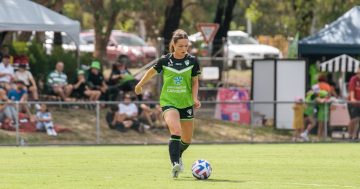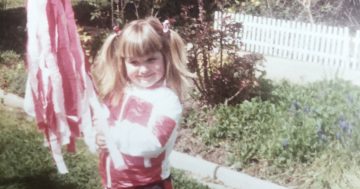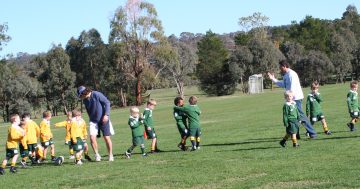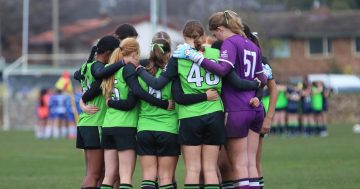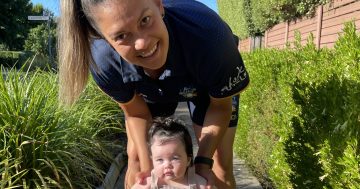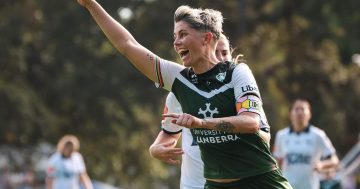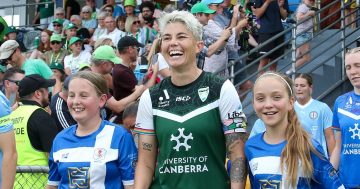
Rhonda with a painting of her likeness at the clubhouse at Majura. Photo: Supplied by Majura Football Club
The Sporting Capital is a sports series by Lachlan Roberts, who has intimate conversations with Canberra’s sports stars. For the sixth article in the series, Lachlan chatted with Rhonda Parkin, who was inducted into the ACT Women’s Honour Roll at the 2018 ACT Women’s Awards last week. Rhonda was nominated for her outstanding efforts in championing women’s football in the ACT, which include forming one of the first ever all-girls teams in Canberra.
Lachlan grabbed a coffee with Rhonda and chatted about her upbringing, how she fell in love with football and why she is inspired to promote women’s football in Canberra in a “man’s sport”.
A country girl growing up
“I grew up number 10 out of 12 children in a little country town in the centre of New South Wales. I grew up with seven brothers and four sisters. I was lucky having brothers because there was a pathway for me with aggression, which when you are competitive, you are allowed to show a certain amount of passion in those days, which my mother tolerated though ‘ladies don’t do that’.
“I grew up with brothers saying ‘you can’t do that’ so I was like ‘I’ll show you I can do this’. Growing up, I was never treated by my brothers as a female, though my sisters did. I made the sporting teams equal because there was seven of them, so with me involved there was four on four. Everything that we played in the dirt was equal. None of my other sisters played because they crocheted and knitted and they are absolutely brilliant at that. I never learnt because they competed against each other and I didn’t like that. I didn’t like the bitchiness if I can put it so harshly, because ‘look at mine’, ‘look at this’ happened all the time.
“With my brothers, I was part of a group. If I wanted to go rabbit trapping, I set my own traps. That was their rule: you did exactly what they did and you didn’t judge. I just had to perform as far as they were concerned, no matter what it was. I had cousins that were males. Boys were everywhere and I am much more comfortable with males even to this day.
“Girls are so harsh on each other. ‘Look at that’, ‘look at this’. I am not into that. And I guess that is where I got along well with a lot of the females in football because we don’t judge. We accept. No matter who they are, what they are and what they look like, you accept them.
“I left home quite young and went to Sydney, met a Scotsman named Bob, got married and then he was transferred to Canberra for work. That is when I got involved in football, which is what I like to call it.
“My father was a big force behind me being who I wanted to be. Years later, he told Bob that I was defiant and that he liked that. The first day my father met Bob, I came home engaged with a Scotsman who had never seen the bush. I remember my father walking out and saying ‘what poor bugga is it’ and he said ‘mate, don’t take her on, she is only little but she is defiant’.
“I remember taking Bob when I first met him to Sydney Cricket Ground to watch the Eastern Suburbs and he said, ‘well I’ll take you to a game of football when Rangers come out’. And then when we had two sons, I knew they would get into football. Our neighbour next door who we called Poppa played for France in the World Cup, and I remember when my oldest son Andrew was barely even walking, Poppa would hold him and Bob would roll the ball to him and he was kicking the ball with both feet.
“I wouldn’t have my sons play any other sport. I fell in love with football. I could see the potential for females in the sport and I could see where girls could be competitive where it wasn’t that brutal, smack in the mouth, tackling, shoulder charging sport. I still love league but I have a passion for football.”

“My father was a big force in me being who I wanted to be” – Photo: Supplied by Majura Football Club.
Taking on the man’s job at Majura
“It was through defiance that I started coaching football. When we joined Majura, it was 1985. It was a young club because it was only born in 1981 through two other clubs in North Canberra merging. When we first joined, I was told to jump into the caravan that we had then and learn how to make hot dogs and make tea.
“I became a coach because I could not get on the executive at Majura. It was a man’s job, it was a man’s club, it was a man’s sport. What would I know? I was told constantly that I was lucky I was married to a Scotsman because I knew nothing about football. I was like ‘Ok, I’ll take that one’. I’d go home and cook him lunch because ‘you shouldn’t be here’. After five years, I knew that if I was going to be a part of the club I would need to be a team manager.
“I never felt that I wasn’t equal. Never! I could do what I wanted to do. And that’s the attitude that I took to Majura. Don’t tell me I can’t do this because I will.”
“The club was only 200 big at the time, and I could see where it could become a girl’s game. There were a couple of girls playing, but they had been really really good to play with the boys. I asked around, I was guided by a couple of men. I think they enjoyed my defiance and they helped me so much by guiding me and giving me support. They didn’t have to give me courage because I always had that.
“Once I started coaching the girl’s team, Majura grew rapidly and that was predominantly due to girls.
“When I started that first team, the quickest way the girls would learn would be if the division one under 14s, which included my son Andrew, when they finished their training, they came over to our training. Then I would mix the girls up with the boys and the boys would tell them, ‘hey, you got to make that run there because I am going to pass the ball there’. And those boys were absolutely brilliant.
“I realised the potential of our females in Canberra but we had nowhere to go with it. Women’s football and men’s football were totally separate in those days. It wasn’t a good relationship at all.
“Western Creek and Tuggeranong were fantastic because they had a girl’s team that they used to run, so we were invited into that. We then started a big promotion to get others involved.
“Jimmy Hayes was helping me coach, and I wanted the girls to understand the whistle of the referee and what the referee wanted them to do. They had to hit that field knowing exactly what a free kick was and what an indirect free kick was. My son Andrew came with his whistle and he reffed them. He gave a signal of an indirect freekick inside the box. These girls are ten-year-olds and one of them knew what the signal meant and set up the wall in the box. They all put their hands over their ‘privates’. I went up to them and said ‘girls, what are you doing?’ And they responded ‘they do this on television’ and then Jimmy and I realised they had only ever seen men playing football on TV. So then I had to explain to these poor ten-year-olds why boys put their hands there and girls should put their hands across their chests. I had to go tell all the parents what I had done to their daughters.
“It kind of hit us that they had never seen women on television playing football. But it was the most magical thing I had ever seen.
“I think that we should drop the word girls and women and just call sport what it is. It should just be cricket. It should be AFL. I don’t know how it will come about, but football does it nicely where we have the Socceroos and the Matildas. If you say Socceroos, people know its the boys. If you say Matildas, they know its girls. How we do it with cricket and everything else, I don’t know that is the way to go. In newspapers, we are kinda of throwing it out there that it’s women. AFL putting the W at the end makes it different. Maybe it should be under the one umbrella, AFL, and then have male and female.
“Girls have to be treated equally in every aspect of the game, whether it is disciplinary, whether it is with fields, they cannot be treated any differently.
“I am known for a saying at Majura, because when we started people said, ‘oh, look there are girls playing’ and I would turn and say, ‘yes, they are footballers, they just happen to be female’. I still say that to this day.”

Rhonda was inducted into the ACT Women’s Honour Roll at the ACT Government 2018 Women’s Awards last week. Photo: Supplied by Capital Football.
Rhonda shared with me her quote that she carries around in her purse that summarises why she has given her time to women and kids in football.
“A hundred years from now it will not matter what my bank account was, the sort of house I lived in, or the kind of car I drove… but the world may be different because I was important in the life of a child.”
A list of Rhonda’s achievements:
- Joined Majura in 1985;
- Coached first all-girls team in 1990;
- Actively promoted all girls football in primary schools in the North Canberra area;
- Started development squad for girls in the ACT with Jimmy Hayes (Capital Football Director of Coaching);
- Fundraised to build Majura’s clubhouse;
- Started a pee-wee program for three to six-year-olds in 1990;
- Vice President of Football for 15 years;
- Canteen Manager for 5 years;
- Capital Football judiciary panel for 13 years;
- Volunteered for the University of Canberra men’s soccer team for 5 years – cooked and served 20 litres of soup and ten loaves of bread every Thursday training for players.











